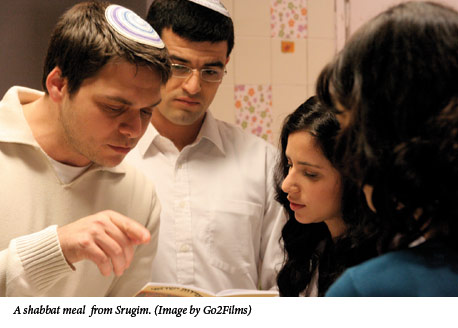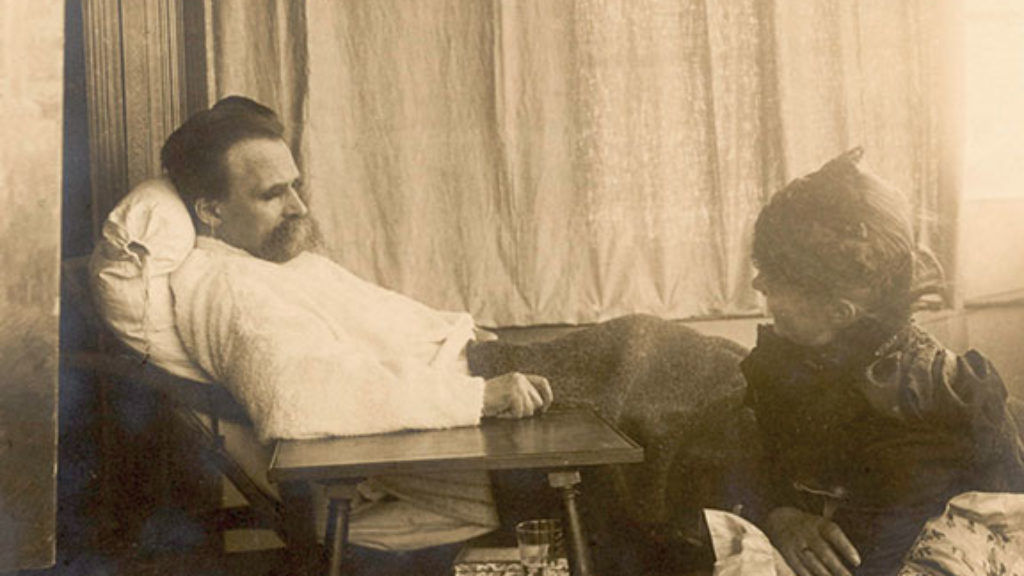No Sex in the City: On Srugim
Srugim is the kind of show that doesn’t usually make it to television, even in Israel. Your conventional network docket does not have a slot for a “faith-based soap opera,” and for good reason—between disinterested non-religious viewers and easily offended religious ones, there would seem to be a very small demographic for such programming. Srugim—the title refers to the knitted kippot worn by modern Orthodox men—never did get the memo, and its first season garnered praise, as well as a sizable audience, from all corners of Israeli society and even some American viewers, who watched it online. After its successful maiden run in the summer of 2008, the show was picked up for a second season, which is airing now, while the first season is available on DVD with English subtitles.
The Srugim storyline follows a group of 30-something modern religious singles in the Katamon neighborhood of Jerusalem as they attempt to navigate the frequently contradictory worlds of contemporary Israel and traditional observance. In the first scene, we meet Yifat, the graphic designer who photoshops kippot onto models in religious product advertisements, and her roommate, Hodayah, a Hebrew University Bible student who struggles daily with her faith. We soon encounter Nati, the surgeon with commitment issues; Amir, the recently divorced ulpana (women’s seminary) Hebrew instructor who moves in with him; and Reut, the high-powered financier who motorcycles to work and is learning to read the haftarah for her women’s prayer group. These characters play a romantic (if generally chaste) game of musical chairs, dating each other and assorted colorful supporting cast members.
So what transforms this ostensibly niche show into an Israeli pop culture phenomenon? Viewers of faith likely appreciate the sympathetic portrayal of the dati (religious) lifestyle and seeing moments of their daily experience brought to life on the screen for the first time—whether it be a typical Shabbat meal, the difficulties of conducting modest relationships, how one keeps a kosher kitchen, or the pressures and loneliness of being single in the marriage-oriented Orthodox world. At the same time, what makes Srugim work for more general audiences is that its protagonists are undeniably human. Srugim is about people who happen not to turn on lights on Saturdays—not about the Sabbath restrictions themselves.
Perhaps most importantly, the show is not out to make a polemical point, nor does it attempt to insert itself into internal religious debates or discussions of the role of religion in Israeli society. Recognizing that religious thought does not reduce to sound bites, the show chooses to portray religious life while avoiding discussions of theology. Rather than question the dati lifestyle, it takes it for granted. Religion is in this manner the backdrop and catalyst for personal interaction, but not the focus.

This non-judgmental stance does not mean that the show whitewashes the fault-lines between different communities in Israel, religious or otherwise. We experience the awkward silence when a pop culture reference is made at the Shabbat table (Seinfeld’s “soup nazi,” naturally), to the confusion of the lone yeshiva student who, it quickly becomes apparent, has never watched TV. We feel the discomfort when an Orthodox man discovers the only pair of tefillin available in the apartment complex belongs to an American girl. And in one of the most powerful storylines of the show, we see how one character’s relationship with a chiloni (secular) man ultimately fails when she is unable to bridge the gap between her world and his.
Thus, rather than having each character unrealistically and unfaithfully alter his or her personal identity, the show instead gives us people who make space for others, without compromising the courage of their convictions. Indeed, the novelty of Srugim is that it manages to seat the modern Orthodox feminist, the yeshiva student, and the chiloni around the same Shabbat table and present it as a possibility, rather than a punch-line.
This optimism is also the heart of the show’s appeal—its characters evince a mutual respect that is all too often lacking in the modern Jewish and Israeli communities (conveniently, the show eschews contemporary Israeli politics). This is evident in the poignant scene where one character, after struggling with her faith and observance, decides to leave religion altogether and adopt the chiloni lifestyle, and her longtime dati roommate convinces her not to move out of their apartment (“I leave hair in the shower, you’re a chiloniyah—we’ll manage!”). Srugim points towards an Israel of much the same spirit.
Not everyone, though, has been ready to jump on the Srugim bandwagon. One prominent Religious Zionist rabbi went so far as to place the show under a religious ban, citing the questionable conduct of various dati characters on the show. “There is bad language and licentiousness. It is not enough to be ‘shomer negiah’ [chaste], and this is also not always followed [on the show]—one needs purity and modesty,” he wrote. There is more to such a rejection than reactionism to immorality on television—at stake here are conflicting visions for the Israeli dati community.
Srugim’s co-creator and director, Eliezer “Laizy” Shapira, and many of its writers and production staff are graduates of Ma’ale, a film school founded in 1989 to encourage the production of entertainment sensitive to the nuances of Orthodox religious life. These students and their teachers believe that for there to be a vibrant Orthodoxy, there must be a vibrant Orthodox artistic culture. But the small yet vocal rabbinic backlash to Srugim throws some of the tensions inherent in this enterprise into sharp relief.
How does a religious community express its experience in art without also depicting and arguably humanizing transgression? There will always be traditionalists who will object to seeing examples of “what not to do” being exhibited by people who otherwise look and act like members of their community. But can one say anything truly relevant about being Orthodox on television if one cannot portray sin, from Sabbath violation to sexual indiscretion?
As Shapira told the Jerusalem Post, to make his characters convincing, “We had to make room for them to repent.” Real religious people stumble and make mistakes. To say anything valuable about their lives is to talk about coping with religious failure. Srugim understands this: its characters have principles, and though they often bend or even break them, they always return to judge themselves by them. A character can return to his ex-wife in a moment of loneliness, while another can prepare to sleep with her boyfriend, in violation of Orthodox Jewish law, before pulling back at the last instant. Together with them, we experience the tug-of-war of faith. Try to find any other soap opera where characters routinely feel guilty over how they have treated other people or how they relate to God.
The remarkable success of Srugim across religious and ideological lines shows that this approach resonates with viewers of all stripes. In a world where shows like Sex and the City tend to glamorize the shallowest elements of human experience, Srugim and its characters manage to strive for meaning and not merely entertainment.
Comments
You must log in to comment Log In
Suggested Reading

Twilight of the Anti-Semites
Nietzsche’s reception has been sharply divided between anti-Semitic and philo-Semitic readings. Richard C. Holub's new book explores how the philosopher's views changed over time and whether some of his statements about Jews should be attributed to another hand.

A Journey Through French Anti-Semitism
There is a problem with the inevitable reflexive warnings after every vicious attack not to slip into Islamophobia. A short personal history of how France got here.
Sephardi Lives: From Ottoman Salonica to Rosario, Argentina
Singing women spark indignation in Salonica, a change of seasons in Argentina requires rabbinic expertise, and Jews in the Ottoman army get fat and happy.
Is Beauty Power?
With charm, business savvy, and determination Kracow-born Rubinstein transformed herself from Chaja to Helena to “Madame.”
Lisa Stern
Wonderful and insightful article on Srugim. Thank you. You outline the depth, complexity, and nuance of the show skillfully. You’re interpretation of Sex and the City, however, demonstrates that you’re unfamiliar with the series. Be sure to watch seasons 3-6!